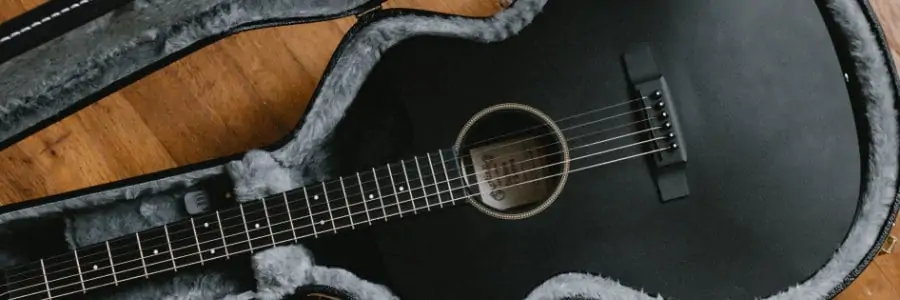One of the main advantages of acoustic guitars, especially when you compare them to their electric counterparts, is their portability. They can be brought and played almost anywhere; however, can you play an acoustic guitar in the rain?
You can’t play an acoustic guitar in the rain, at least not if you want to keep it in good condition. While you wouldn’t risk electrocuting yourself (like you would with an electric guitar), rain can still cause significant damage to the instrument’s body, fretboard, and joints.
If you’re interested in learning more about why playing an acoustic guitar in the rain isn’t a good idea, read on. However, knowing that sometimes you don’t have a say in the matter, I’ve also included some tips on protecting your acoustic guitar from the rain when contact is inevitable.
Reasons Why You Shouldn’t Play an Acoustic Guitar in the Rain

You shouldn’t play an acoustic guitar in the rain for several reasons, so let’s discuss them individually.
Water Can Damage the Wood
Acoustic guitars are predominantly made of wood, which, regardless of its variety, is a porous material that tends to hold onto moisture. For this reason, when wood gets wet, it can rapidly change its shape by cracking, warping, or even rotting.
As expected, such drastic changes to a guitar’s structural integrity can lead to issues with its tone and playability, sometimes rendering it completely unusable.
The Metal Components Can Rust
The metal components of your guitar aren’t safe from water damage either. Your tuning pegs, frets, and strings can quickly rust if exposed to excess moisture. These metal components will corrode and weaken until they ultimately break. And up until that point, the guitar’s sound and playability will also suffer.
Water Can Cause a Guitar To Fall Apart
There’s still another essential component that I’ve yet to discuss – the joints. Though often an afterthought for many players, these keep your instrument intact, and they’re usually held together with glue.
Unfortunately, depending on the type, quality, and age of the adhesive used on your guitar, water can disintegrate it, causing the whole instrument to fall apart.
Loss of Tonal Quality
Though sometimes the physical components of your guitar may seem fine, there’s still a chance that the damage is significant enough to have caused a loss of tonal quality.
The sound an acoustic guitar produces is created by the strings’ vibration that gets amplified by the hollow body. When the instrument gets wet, it becomes heavier and less responsive, which can lead to a significant decrease in sound quality.
If water gets inside the guitar’s body, the instrument’s resonance and projection will also suffer.
Difficulty Playing
Even if you were to accept the possibility of ruining your guitar, playing it in the rain would be difficult in the first place. The water will make the strings slippery, making it much more difficult to get a decent grip on them. Conversely, the fretboard will feel sticky, creating an unpleasant playing experience.
Your struggle to hold and play the guitar will only cause further tear and damage to its body.
Safety Hazard
Though acoustic guitars don’t work through electricity, if you’re playing a set, chances are you’re surrounded by electric equipment either way. So, even though the guitar can’t shock you, playing it outside in the rain (assuming a whole set of electrical devices surrounds you) will still be hazardous.
How To Protect an Acoustic Guitar From the Rain

With all that said, I know that keeping your guitar from coming in contact with water isn’t always possible. For that reason, though doing your best to keep your instrument dry is a good idea, it might also help to know a few protective measures in case you don’t get a say.
Here are some of my top tips on how you can protect an acoustic guitar from the rain:
Always Keep a Rain Cover With You
Whenever you plan on taking your guitar outside, take a rain cover with you, even if the forecast predicts the weather will be warm and sunny. These covers are made of waterproof materials that keep an instrument completely dry for hours on end.
If you don’t have a rain cover, you can always rely on an umbrella (though that won’t be as effective.
Wipe Down the Guitar As Soon as You Go Inside
If getting your acoustic guitar wet is inevitable, at least try to bring it somewhere sheltered and wipe it down with a dry cloth as soon as you do so. Be thorough and focus on the areas that have collected the most moisture.
Pay special attention to the soundhole, fretboard, and strings, as these are the components most susceptible to damage.
Follow the Right After-Care Steps
After you’ve managed to take your guitar to a sheltered space, keep it as dry as possible by avoiding high-humidity areas at all costs. I recommend using a dehumidifier to help the instrument dry out quicker. A blow dryer can also work, though you should be careful. Alternatively, you can invest in silica gel packets, which you can always keep in your guitar’s case.
The faster you get all the moisture out, the better your chances of the guitar returning to its original state without incurring any damage.
Conclusion
Playing an acoustic guitar in the rain isn’t as hazardous as doing the same with an electric instrument, but it’s still not a good idea. Getting an acoustic guitar, predominantly made of wood, wet can cause irreparable damage to its structure and sound.
That’s why you’ll want to try your best to keep your guitar away from rain and excessively humid places. If contact with water is inevitable, you can try some of the abovementioned tricks to protect the instrument and minimize potential damage.
If you found this article useful, you may want to save this pin below to your Guitar board.

Recent Posts
When learning new songs have you noticed that some of the chord sequences sound really good? But when you tried to come up with your own chord sequence, or as we call it chord progression, you found...
Some guitarists insist on buying an expensive amplifier with their electric guitar. They assume that this is a must for every type of guitarist out there. However, in some situations, this isn’t...

